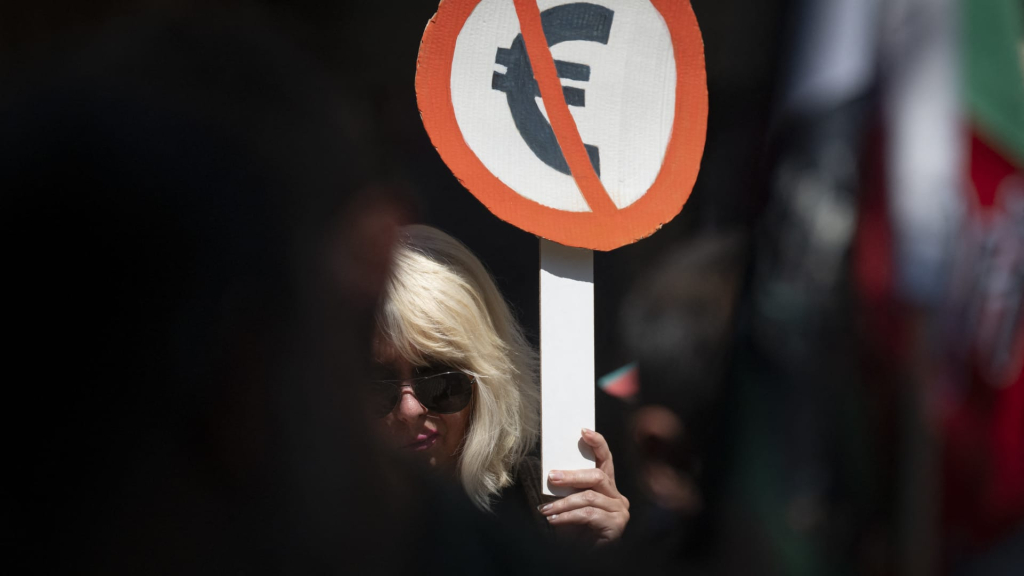Bulgaria is poised to join the eurozone as its 21st member, having received approval from both the European Commission and the European Central Bank in the previous week. However, opposition to the transition is mounting.
Despite this, rising concerns about escalating prices and a perceived loss of sovereignty have sparked protests organized by nationalist factions against the country’s intention to adopt the euro. A recent survey by the European Union revealed that approximately half of Bulgaria’s citizens oppose switching currencies.
Experts, including economists, have voiced their opinions on the risks associated with joining the eurozone, assessing both potential benefits and drawbacks for the Eastern European nation.
Inflation and interest rates
One of the most pressing concerns is the possibility of a price surge during the currency transition, which may lead businesses to increase prices. Many Bulgarians, particularly in economically disadvantaged rural areas, are anxious that eurozone membership could diminish their purchasing power. Economist Valentin Tataru from ING noted that although there may be some transitional inflation, the longstanding fixed exchange rate of the Bulgarian lev to the euro should mitigate severe impacts.
Another significant concern revolves around the implications of abandoning the lev for national autonomy, particularly regarding monetary policy. Andrius Tursa, an advisor at Teneo specializing in Central and Eastern Europe, highlighted that the transition to the euro could be viewed by some as surrendering national control. The Bulgarian National Bank would lose its exclusive authority to set interest rates based on national economic conditions, as membership in the eurozone subjects the country to the decisions of the European Central Bank.
However, Tursa pointed out that eurozone membership could lead to lower interest rates, which generally favor borrowers and make loans and mortgages more affordable.
Economic stability and power
Jasmin Groeschl, senior economist for Europe at Allianz SE, indicated that joining the eurozone and aligning with the ECB could enhance Bulgaria’s economic stability and growth potential. She noted that foreign investment might increase as a result, and GDP could grow with eurozone membership.
Groeschl emphasized that deeper financial integration under ECB supervision would solidify Bulgaria’s financial system and monetary stability. Moreover, adopting the euro could strengthen Bulgaria’s ties with the EU, enhancing both influence and credibility.
Key sectors such as trade and tourism, crucial to the Bulgarian economy, stand to gain from this integration, as many of Bulgaria’s major trading partners are EU members, with significant exports directed towards the bloc. Tursa noted that tourism has become increasingly important, with over 13 million international visitors recorded in 2024.
“Bulgaria’s accession to the eurozone would streamline trade and tourism with other eurozone nations by removing the expenses and complexities of currency conversion,” Tursa added, underlining the importance of this move given Bulgaria’s integration into EU supply chains.
Political tensions
Economists have also highlighted potential political tensions surrounding Bulgaria’s euro adoption. Public opposition has already escalated into significant protests, and Tursa warned that this issue could fuel rising support for populist and Euroskeptic movements in the long run.
Despite these local protests and trepidations regarding eurozone membership, Groeschl argued that the long-term advantages likely outweigh the disadvantages. She noted that the transition entails some loss of economic autonomy in exchange for deeper integration into European markets, but that the benefits, including increased economic stability and reduced transaction costs, generally surpass the drawbacks.
Tataru echoed this sentiment, asserting that with the lev closely tied to the euro, severe disruptions during the transition phase are unlikely. He maintained that joining the euro stands as a strategic measure for Bulgaria to secure sustained prosperity and deeper integration into Europe.


























